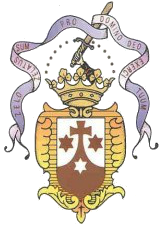J.M.+ J.T. Carmel of Lisieux
May 1, 1903
Jesus
My very dear Sister,
How long I have delayed in responding to your good letter! May my little Thérèse bring you my excuses …
I see that you love this small celestial flower as a true sister, and I rejoice because of the great benefits that you will draw from your devotion.
I wish to remember well all your intentions. Pray for us too, dear little Sister. You are not unaware of the persecution which is erupting in France.1 We are certainly on the eve of being evicted from our Monastery. You understand that it will be a great sacrifice for us to leave this Carmel, where the good Lord has so often made His marvels manifest. At last the hour has come to imitate the filial abandonment of our beloved “little Queen2“, for the Diving King, our Spouse.
You ask yourself, dear Sister and friend of Thérèse, to whom you are addressing your letter – ? I am going to satisfy you by telling you that it is to the “little Mother” of your sister in heaven, to the Pauline “that she loved as a mother”3. Alas – and who is so unworthy to have been that! It has been a year that I am Prioress.4 Our good Mother Marie de Gonzague5 completed her six years. It was impossible, unfortunately, to re-elect her1! Pray for me, little Sister. Ask Jesus that I may love Him as my little Thérèse has loved Him.
I well understand your pain on being separated from your good Mother Prioress.2 This reminds me of what Thérèse wrote: “Seeing that in Carmel it was possible to have even more separations, I wanted, in advance, to live in heaven3.” Let us imitate our dear little sister; let us also live in heaven and in the heaven of heavens, which is in the Heart of our Jesus.
Sr. Agnes of Jesus, r.c.i.4
Prioress
I know well the English translation of the book.5 What do you wish to tell me by the translation “shorn roses”? I did not understand that passage of your letter.
All that you tell me of the good that is done by your “rose petals”6 fills me with joy. This is happening everywhere. How admirable God is!
I am sending you a small souvenir7 so that you will patiently await our mailing.
1 The 1901 Law of Associations caused the closing of 1500 religious houses and over 3000 Catholic schools over the next four years, and was climaxed in the Law of Separation of Church and State in 1905.
2 This was a nickname given to Thérèse from childhood by her father.
3 When Sr. Thérèse lost her mother at the age of three, she chose her sister Pauline as her ?little mother@. In 1882, Pauline entered the Carmel of Lisieux and became Sr. Agnes of Jesus.
4 Mother Agnes of Jesus, Prioress from 1893-96, was again elected to that office in 1902.
With the exception of eighteen months (the Priorate of Mother Marie-Ange, 1908-09), she would be Prioress until her death in 1951, having been confirmed in office by Pope Pius XI in 1923.
5 Mother Marie de Gonzague (1834-1904), Prioress of the Carmel of Lisieux for many years, left the mark of her strong personality on the community. She was Prioress during most of the religious life of St. Thérèse, with the exception of the three years of Mother Agnes= Priorate.
1Outside of execptional circumstances, the Prioress in Carmel can serve only two consecutive three-year terms at a time.
2 Here Mother Agnes refers to Mother Beatrix of the Holy Spirit (Camilla Magers), 1836-1939, Foundress and Prioress of the Carmel of Boston, Sr. Stanislaus= Novice Mistress. She accompanied the Sisters from Boston to the foundation in Philadelphia. When Mother Gertrude began to suffer from her final fatal illness, Mother Beatrix was called from Boston and appointed Prioress. She oversaw the building of the present monastery and governed the Community until she made the foundation to Rochester, New York in 1930, where she died at the age of 93.
3The Story of a Soul, Chapter 10. (Page 216 of the edition translated by Fr. John Clarke, O.C.D. – ICS Publications, 1976)
4 These initials (in Latin) stand for ?unworthy Carmelite religious@; it was the custom for signing one=s religious name at that time.
5 Possibly a popular life of Sr. Thérèse.
6 Mother Agnes refers to favors received by the distribution of the rose petals (touched to the grave of Sr. Thérèse) that were being sent to the Carmel of Philadelphia.
7 The >souvenirs= were the rose petals or soil from the grave.
